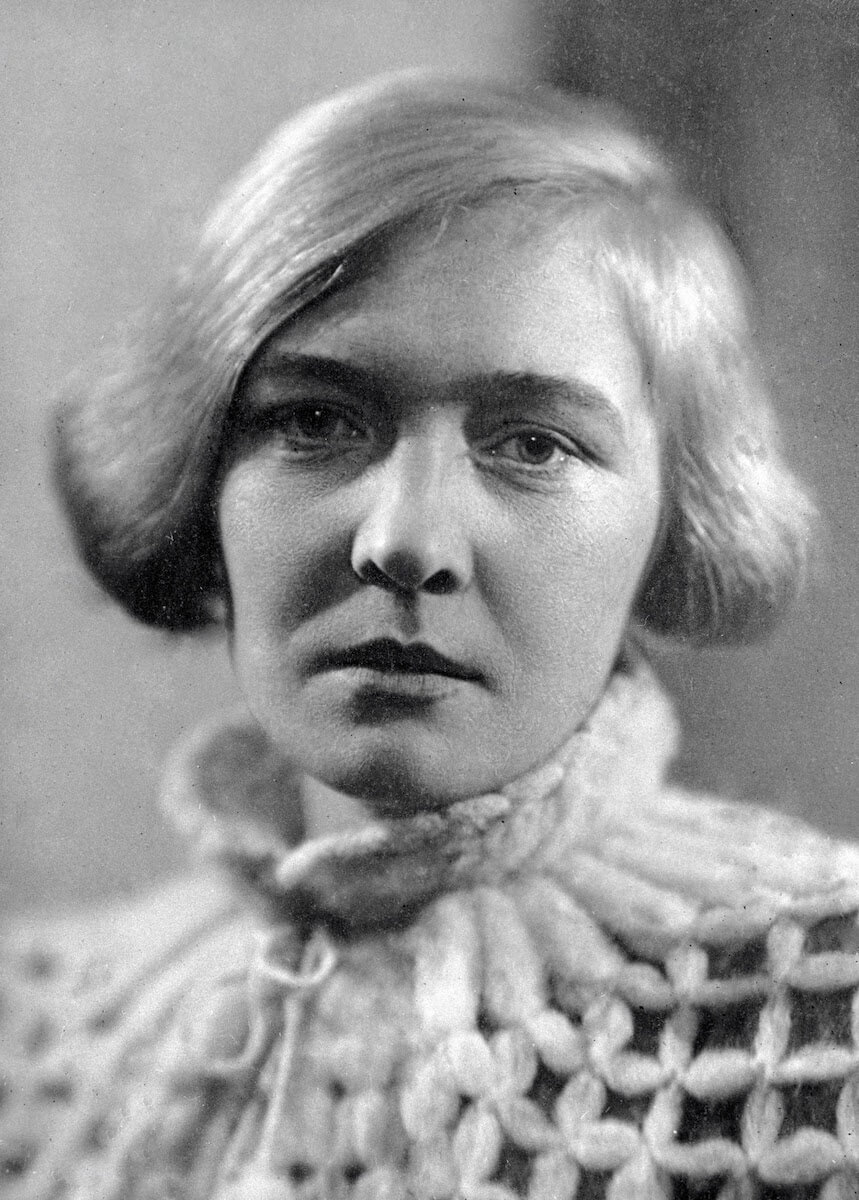オリガ・ベルゴーリツの生涯О жизни О. Ф. Берггольц

女流作家で詩人のオリガ・ベルゴーリツは、1910年5月16日ペテルブルグ郊外の労働者地区で生まれた。父は、工場所属の医者だった。ベルゴーリツは十代の頃から詩才をあらわすようになり、15歳になる直前に作品が新聞に掲載されている。1925年ベルゴーリツは、青年文学グループ「後継」に参加。そこで詩人のボリス・カルニーロフと出会い、まもなく結婚した。しばらくして娘のイリーナが誕生。1930年、ベルゴーリツはレニングラード大学文学部を卒業、カザフスタンで新聞「ソビエトの草原」の記者として働いた。ちょうどこの頃、ベルゴーリツは離婚し、大学の同級生であったニコライ・マルチャーノフと再婚している。そしてレニングラードに戻ったベルゴーリツは、ある工場の社内新聞の編集員として働く。
しかし数年後、ベルゴーリツの人生に悲劇が訪れる。次女のマヤが亡くなり、その2年後には長女のイリーナも亡くなったのだ。
さらにスターリンの粛清の嵐の中、反体制的とみなされて1938年12月投獄される。そして1939年7月に釈放。投獄された当時、ベルゴーリツは妊娠していたが、拷問にかけられた後で死産している。1939年12月、検閲から逃れるために厳重に隠していた日記に彼女はこう書いている。
「釈放から5ヶ月経った今、監獄の重苦しい匂いや魚の匂い、湿気が釈放された当時よりも強烈によみがえってくる。誰かが階段を上る足音が聞こえる。取り調べに呼び出されて向かう時の他人事を見るような感覚、不自然な落ち着き、絶望感、閉塞感。〈中略〉臭い手で他人の魂をほじくり返し、唾を吐きかけて、汚した後にこっちに無造作に返してきて、『生かしてやる』と言う」。
1941年から43年のレニングラード包囲の時、ベルゴーリツはドイツ軍に取り囲まれたこの町にいた。「ソビエト作家」出版所に爆弾が落下した時のことを彼女は『禁じられた日記』の中にこう書いている。「(出版所の:訳注)ほぼみんな殺されてしまった。ターニャ・グレーヴィッチも死んでしまった− 彼女とは古くからの知り合いだ。感じが良くて明るい女性だった。ついこの間も出版所にお金の件で行って彼女と話した。セミョーノフは、命は取り留めたけれど、重傷を負った。そう、ほとんどの人が死んでしまったのだ。ただ防空壕に逃げたタイピストは助かった。ということは防空壕に逃げないといけないのだ! サイレンが鳴ったらすぐに逃げるのだ……助からないと、助からないと、助かることはできるのだから……おお、卑劣な考え!あの人たちのことは可哀想だけど。でも最初に浮かんだのは自分のことだ。教訓にしないと、という考えだ。みんなも同じだとわかっている」
1941年6月、ドイツ軍によるソ連侵攻の始まりとほぼ同時期に、ベルゴーリツはラジオ委員会に就職し、以後放送を通して市民を励ましていくことになる。
一方、彼女の夫は重症の癲癇を患っており、1942年1月、入院。それと同時にベルゴーリツは非常事態体制下でラジオ委員会の建物で寝泊りするようになる。当時の思いを彼女は日記に書いている。
「……もしあなたが死ぬのなら、私も一緒に死にたい。こうしてあなたを善良な人たちに預けて、自分はラジオ局で執筆することで、引き込まれそうな底無しの死の恐怖から逃げようとしている。それとも死と向き合って、あなたの理性を失った、恐ろしい顔のあなたのそばにいるべきだろうか?でも私たちは2人とも生き抜かないといけない。あなたのそばにいたら、へとへとに疲れ果てて、あなたのためにとっておきたい最後のエネルギーも無くなってしまう」しかし1942年1月、夫は亡くなった。夫の訃報を受けた時の思いをベルゴーリツは次のように書いている。
「おお、どうしてこんなことになったのか……あなたはなんと困難と辛苦に満ちた人生を生きたのか、幸せをほとんど味わうこともなく、その到来を待つことなく、あなたは死んでしまった……いや、やはり私は彼を看取るべきだったのだ。ひょっとしたら私の顔も見分けがついたかもしれない。私がどれほど彼を愛しているか語ることもできたはずだ。そうしたら、もっと幸せな死に方ができたかもしれない……」
ベルゴーリツはほとんど毎日ラジオ番組を放送した。その内容は後に出版された著書「こちらはレニングラードです」に収められている。多くの人々が餓死し、死体がうずたかく積まれていく街でベルゴーリツの声がラジオから止むことなく流れていた。凍りついたネヴァ川へ水を汲みに疲れきった人々が向かう時も、銃撃戦の間も、パンの配給が1日わずか120グラムになってしまった最も辛い日々にもベルゴーリツの声が響き、詩が朗読された。その声は人々にとって親しい友の声と聞こえた。ある女性は語っている。「人間としての尊厳を失いそうになる時、あなたの詩が助けてくれるのです。いつもちょうどいい時に私を助けてくれました。12月に夫が亡くなったんですけれどね。マッチが、マッチがなかったんです。ランプがしょっちゅう消えてしまって、芯をつついて直すんですけど、すぐ折れてしまって火が消えるんです。私は夫の口にスプーンで食べ物を運んで食べさせるんですけれど、スプーンが鼻の方にいってしまって、しまった、と思っている時にあなたの詩が聞こえてくるんです。そうすると二人とも気持ちが楽になりました。〈中略〉そして昨日はもう私、身体が弱って衰弱してしまって横になっていましたが、砲撃でベッドが揺れるんです。布にくるまって横になっているんですが、すぐ近くに弾丸が飛んできていて、またベッドが揺れて、もう恐ろしくて、暗闇だし。その時にまたあなたの詩が聞こえてきたんです・・・そうすると生きている実感が湧いてきました」凍りついた薄暗いレニングラードの家々で聞くベルゴーリツの声はレニングラードそのものの声となっていった。
戦後、ベルゴーリツは創作活動を続け、1975年に逝去している。
オリガ・ベルゴーリツ略年譜
| 1910 | ペテルブルグの医師の家庭でベルゴーリツ誕生 |
|---|---|
| 1924 14歳 | ベルゴーリツの詩「レーニン」が、父が医師として働いている工場内の新聞に初めて掲載される |
| 1925 15歳 | 新聞「レーニンスキエ・イスクルィ」に詩「旗の詩」が掲載される |
| 1927 17歳 | 国立芸術史大学芸術学コースで学ぶ。その後同大学は閉鎖され、レニングラード大学に移籍 |
| 1928 18歳 | B. コルニーロフと結婚。10月娘のイリーナ誕生 |
| 1930 20歳 | B. コルニーロフと離婚。N.モルチャーノフと事実婚(入籍は1932年) 12月 大学を卒業し、娘を母に預けて夫婦でカザフスタンの新聞社で働く |
| 1931 21歳 | レニングラードへ帰郷。「エレクトロシーラ」工場の新聞編集部に就職 |
| 1932 22歳 | 夫のモルチャーノフが徴兵されるが、重症の癲癇のため除隊 次女マイヤ誕生 |
| 1933 23歳 | 次女マイヤ死去 |
| 1934 24歳 | 初の詩集発刊。ソビエト作家同盟メンバーに選ばれる |
| 1936 26歳 | 長女イリーナ死去 |
| 1937 27歳 | 大粛清始まる 「人民の敵」と関わりがあるとして作家同盟を除名される 当時、ベルゴーリツは妊娠していたが、参考人として取り調べを受けた後、病院に運ばれて流産する 「エレクトロシーラ」工場を解雇。中学校のロシア語教師となる |
| 1938 28歳 | 「テログループに参加した」という無実の罪で逮捕、投獄される。獄中で詩作 |
| 1939 29歳 | 釈放される |
| 1941 31歳 | 6月ドイツ軍がソ連を侵攻。ラジオ委員会に就職 8月 初めて放送マイクに向かう 9月 レニングラード包囲始まる |
| 1942 32歳 | 1月 夫N.モルチャーノフ死去 3月 重症の栄養失調にかかったベルゴーリツを友人たちがモスクワへ疎開させる。ベルゴーリツは、モスクワではレニングラードの惨状が伝わっておらず、語ることも許されないことを知る。同月、父がシベリアに送られる 4月 レニングラードに帰郷。同僚のG.マコゴネンコと結婚 8月 ショスタコービッチの交響曲第7番が演奏される |
| 1943 33歳 | 1月 レニングラード包囲解除。このニュースをベルゴーリツがラジオで伝える。「レニングラード市民の皆さん、同志の皆さん、友人の皆さん! 包囲が突破されました!」 2月 包囲後最初の列車がレニングラードに到着(1941年8月から列車は運休が続いていた) 6月 ベルゴーリツ「レニングラード防衛」賞を受賞 |
| 1945 35歳 | 5月 ソ連作家同盟総会で、ベルゴーリツの詩が、包囲されていた市民の困苦ばかりを書いているとして批判される |
| 1953 43歳 | スターリン死去 |
| 1956 46歳 | ピスカリョフ墓地記念碑の有名な碑文「誰も忘れられることはない、何も忘れられることはない」を書く(碑文が公開されたのは1960年) |
| 1958 48歳 | ベルゴーリツ選集(2巻)モスクワで出版 |
| 1959 49歳 | G. マコゴネンコと離婚(正式には1962年) |
| 1960 50歳 | 『昼の星々』モスクワで出版 |
| 1968 58歳 | 『昼の星々』映画化 |
| 1970 60歳 | 詩集『忠誠』出版 |
| 1972 62歳 | 詩集『追憶』出版 |
| 1975 65歳 | ベルゴーリツ死去 |